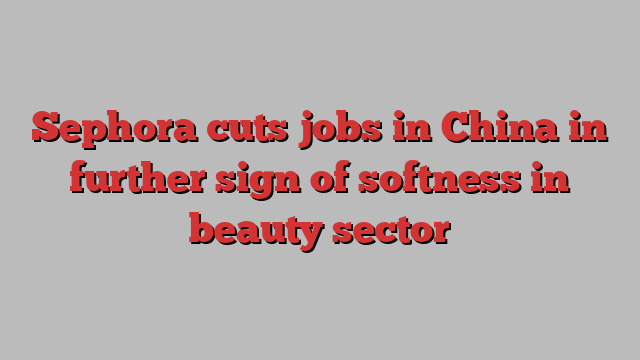
Unlock the Editor’s Digest for free
Roula Khalaf, Editor of the FT, selects her favourite stories in this weekly newsletter.
Sephora is cutting back its workforce in China as one of LVMH’s biggest revenue generators struggles to gain traction in the tough mainland beauty market.
The beauty retailer is reducing its headcount in China by about 120 roles, it said on Wednesday, with a focus on streamlining roles at headquarters.
Although the cuts represent less than 3 per cent of Sephora’s China-based workforce of 4,000, they point to pressure in the country’s highly competitive and price-sensitive beauty market as buyers cut back on purchases.
“In response to the challenging market environment and to ensure our future growth in China, Sephora China is currently streamlining our organisational structure in our head office to ensure we have the right capabilities for long-term sustainable growth,” the company said in a statement, adding that those affected were being offered severance packages, compensation and career support services.
The job cuts were first reported by Bloomberg.
Sephora is one of the French luxury group’s biggest brands and profit centres after Louis Vuitton and Dior, and has continued to generate strong growth at a time when much of the luxury sector is slowing down.
It has been very successful in North America, the Middle East and Europe, but has long struggled in the Chinese market.
The brand is the latest in the beauty sector to signal weakness in China after both L’Oréal and Estée Lauder said soft demand, especially for more expensive prestige products, was impacting their businesses.
On Monday, Estée Lauder issued a gloomier than expected outlook for the year “mainly driven by its significant business in mainland China and Asia travel retail”.
Revenues at LVMH’s selective retailing division grew 8 per cent on a like-for-like basis in the first half of the year, driven by the performance at Sephora, even as the group’s sales of handbags and ready-to-wear fashion plateaued and champagne fell.
However, while Sephora has grown to have 340 stores in China since entering the market in 2005, competing against local brands and cheaper products readily available on Alibaba and Tmall has proved challenging for a brand focused on prestige and product exclusivity rather than price.
While Sephora says it remains “focused on serving our customers across China and delivering a curated, exclusive and innovative prestige beauty experience”, it has retreated in other markets in the region, exiting Taiwan and South Korea in the past 18 months.